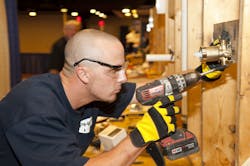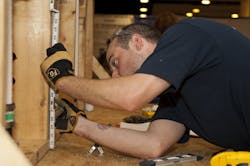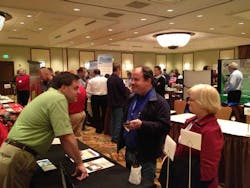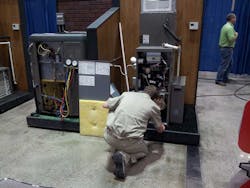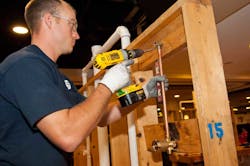Contractors, manufacturers are promoting the plumbing trade, educating its workforce
The job security is there. Reports indicate that the plumbing and HVAC industries will need 700,000 new professionals by 2016; and installation and service for HVAC, water heating, and commercial refrigeration equipment is the second-fastest growing mechanical trade in the nation. Let’s face it, every commercial building and most homes in America contain plumbing and HVAC systems that must be maintained, and, with maintenance requirements and new construction beginning to pick up, the need for technicians only will increase.
The reputation is there. Not only are workers in the p-h-c industry in high demand, but they are becoming increasingly respected as technology is requiring enhanced knowledge and skills. With these jobs, workers not only can support a family and live a middle-class lifestyle, but they can become part of a solution in this thriving industry — installing and repairing new technologies and products that meet the latest requirements, keeping homeowners and business-owners comfortable and even suggesting ways to save energy!
The role of preparing this workforce? Fortunately, it’s falling to those who know the industry best: the skilled professionals who are passionate about their business; the trade organizations that are dedicated to moving the industry forward; and the manufacturers that want experienced craftsmen to install and repair their products correctly.
“This is an industry that offers something for everyone, from engineering or sales, to installation and service,” says Jason McKinnon, manager of training and technical support at Viega, a global leader in plumbing, heating, and pipe joining systems. “There are so many opportunities … whether you want to work in the field or in an office, there is a position within this industry that you’ll be interested in.”
Kohler, a manufacturer best known for its plumbing products, also supports industry educational programs as it continues to cultivate high-quality tradespeople to deliver a great customer experience with its products. “Without a well-trained professional trade, we couldn’t possibly bring the level of innovation to market that helps set Kohler apart,” says Jim Lewis, Kohler’s director of strategic and emerging markets. Kohler’s various training venues to the trade include in-person training through its sales force and product-focused e-learning modules on its trade-specific website: www.kohler.com/advantage.
Beyond this, those promoting the industry and educating its workforce are today’s contractors and other skilled professionals who have a vested interest in securing a trade they treasure. They are getting increasingly involved in local apprentice programs, serving as instructors in trade schools, and leading sessions in industry workshops and conferences.
Here’s where those who are building a career in this vital industry can find some of this top instruction:
HVACR & Mechanical Conference
Held annually every March, this jointly-sponsored event, www.instructorworkshop.org, offers free education designed to provide instructors, industry trainers, and administrators with cutting-edge technical information and teaching techniques to effectively educate the next generation of skilled workers for the plumbing and HVACR industries.
Having spent 13 years in the HVAC field working on new construction, installation, and service, Kevin Couch now teaches an HVACR course at the conference, in addition to his duties at the R. G. Drage Technical Center in Massillon, Ohio. Couch is passionate about instilling “the basics” in his students. “The theories have changed, but you still need to know the basic content,” he says. “It’s like building a house; you have to have a strong foundation, and then you can take it where you want it to go.”
While Couch says there’s no denying the need for workers in the p-h-c industry, “where the individual student falls into that melting pot will depend upon them,” he adds. “There’s a niche out there; you just need to figure out where it is for everyone.” For example, students who are good troubleshooters may go into service and repair, Couch explains. Those with more creative minds may go into new construction. “We need it all,” he says.
Apprentice programs
One of the most comprehensive apprentice programs is the PHCC Educational Foundation’s four-year apprentice curriculum. Businesses across the country continue to rely on its curriculum, textbooks and other materials, which are developed by a team of contractors, educators, and code experts and are approved by the Department of Labor.
To support instructors who are teaching HVACR and plumbing courses as part of various apprentice programs, as well as those teaching in secondary and post-secondary schools, the Foundation hosts a series of Regional Instructor Workshops each year. In 2014, these sessions will be offered through PHCC chapters.
The Foundation urges contractors to get involved in their local apprentice programs. As an example, Rich Kerzetski — with more than 40 years’ experience in the industry — is a member of the Joint Apprenticeship Training Committee (JATC) of PHCC Nevada. Not only is he owner and president of Universal Plumbing and Heating Co. in Las Vegas, but he is passionate about serving as an instructor, as he’s done for 12 years. “I see it as my responsibility to take my experiences and knowledge and apply it to the PHCC curriculum so that the future generations have an advantage,” he says. “Without a training program, future journeymen are trained at the discretion of their employer … what is important to that company. In an apprentice program, training is well rounded by being exposed to the entire plumbing industry.”
Another master plumber, Bob Hahn, teaches plumbing and HVAC at HoHoKus Schools of Trades in Paterson, N.J., an affiliate of Eastwick College. A partner at All Season Energy Services LLC, he also serves on the PHCC Plumbing Apprentice Committee and is chairman of the national SkillsUSA plumbing contest. “As a licensed master plumber and educator, I have always believed in and supported applied or practical training programs,” he says. “Unfortunately, our society has moved away from the trades and is more supportive of the academic college programs. I still feel it is important to have outstanding training programs for our future plumbers and tradespeople. I am encouraged that schools like HoHoKus are adding the apprenticeship program within their college curriculum.”
Hahn stresses the importance of apprentice programs that are available to young people on the same level as college programs. “They can enter a training program and not have the large loans over their heads when they graduate,” he says. Of course, Hahn emphasizes that these training programs must be on the cutting edge of technology and applauds manufacturers that have training centers — such as Viega’s center in New Hampshire — that focus on the new technologies needed for the products they are producing.
“The most important thing is to ensure that our future generations are up-to-date on the latest technologies,” says Viega’s Jason McKinnon. “Looking back 50, 25 or even 10 years, the industry has changed so drastically. We need to ensure that, as products and materials evolve, so do the areas of expertise for the designers, installers, and everyone else in the industry.”
Merry Beth Hall is Director of Apprentice and Journeyman Training for the PHCC Educational Foundation. In this role, she is responsible for curriculum development, assessment testing, continuing education, and organizing the Foundation’s annual plumbing and HVAC apprentice contests. She also serves as co-chair for the national SkillsUSA plumbing contest. She is a graduate of James Madison University and Virginia Commonwealth University with degrees in education and nonprofit management.
